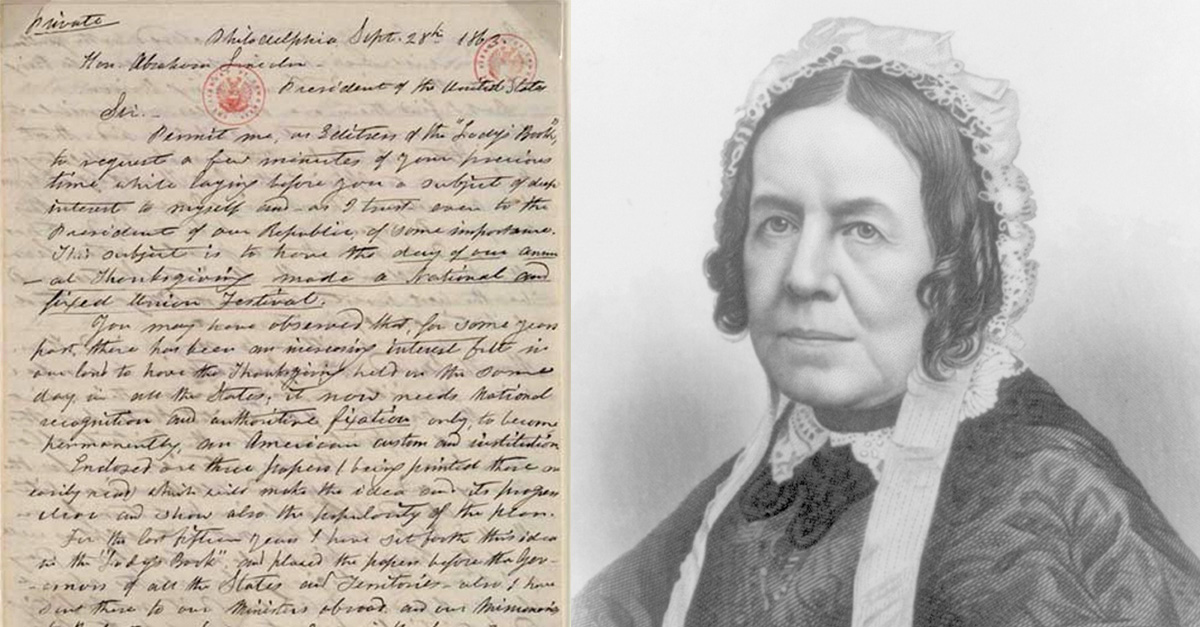


Get a free copy of Parental Rights & Education when you subscribe to our newsletter!

Erased from history by progressive feminists, Sarah Josepha Hale was the driving force behind our national holiday to collectively honor “the Source of our prosperity” and “the Giver of all our good gifts.”
Modern feminists love showcasing their so-called “GirlBoss” symbols of empowerment — those ambitious, groundbreaking women who supposedly shattered the fabled “patriarchal glass ceilings.” Think Hillary Clinton, Kamala Harris, Nancy Pelosi, and, of course, the new “women” of progressivism: Admiral Richard “Rachel” Levine and Sarah “Tim” McBride, Delaware’s newly elected trans congressman.
But today’s feminists conveniently overlook one of the most accomplished women in American history: Sarah Josepha Hale. Ever heard of her? Probably not. That’s because Hale’s values collide with the prevailing leftist objective for our country.
Yet, Hale — an acclaimed editor, author, and the driving force behind Thanksgiving as a national holiday — is the very definition of a pioneer. She thrived in a time when women truly didn’t have the same opportunities as men. If feminists were honest, they’d celebrate Hale as an original “GirlBoss.” But with progressives, it’s never about gender, despite their claims — it’s always about ideology.
That’s where we come in. You’re here because you know we’re going to give you the real story — the one the “legacy” media keeps buried. If stories like Hale’s gained attention, lib journalists would have to admit how many of America’s key figures were devout Christians. They can’t have that.
So, let’s dive in. Born in 1788 in Newport, New Hampshire, Sarah Josepha Hale was a trailblazer in every sense of the word.
First woman to lead a major magazine, Godey’s Lady’s Book? Check.
Self-taught? Check.
Helped start Vassar College? Check.
Author of Mary Had a Little Lamb, one of the most iconic nursery rhymes ever? Check.
Raised five kids by herself after her husband’s premature death? Check.
In fact, her literary career began out of necessity. Widowed at a young age, Hale wrote poems, novels, and essays to support her family. But here’s the twist: She didn’t just write to survive — she thrived.
She transformed Godey’s Lady’s Book into America’s premiere women’s magazine, with circulation skyrocketing to 150,000 by 1860. Her platform attracted contributions from heavyweights like Ralph Waldo Emerson, Edgar Allan Poe, and Nathaniel Hawthorne.
Hale wasn’t just about ink and paper, though. She championed women’s education, advocated for keeping one’s house in order, and even spearheaded efforts to protect and preserve George Washington’s Mount Vernon estate.
She also wrote the novel Northwood, a work of fiction to promote the idea of setting aside a day for national gratitude.
This brings us to her most enduring legacy: Hale’s unyielding push to inaugurate Thanksgiving as a federal holiday.
Sure, presidents like George Washington had issued thanksgiving proclamations in the past, and various states had their own observances from time to time. But for Hale, that wasn’t enough. She wanted a yearly day dedicated to shifting the nation’s focus back to God.
Hale envisioned Thanksgiving Day as a time “when the noise and tumult of worldliness may be exchanged for the laugh of happy children, the glad greetings of family reunion, and the humble gratitude of the Christian heart.” She said this day would be “holier” than the Fourth of July because, while Independence Day celebrates freedom and liberty, Thanksgiving would collectively honor “the Source of our prosperity” and bless “the Giver of all our good gifts.”
By 1861, as the nation was about to plunge into a full-scale civil war, Hale urged Americans to “acknowledge that the goodness of God has not failed. Shall we not, then, lay aside our enmities and strifes, and suspend our worldly cares, toils, and pursuits on one day in the year, devoting it to a public Thanksgiving for all the good gifts God has bestowed on us and on all the earth?”
Determined to make her dream a reality, Hale had already spent decades writing letters to numerous U.S. presidents, pleading for them to embrace her cause. Yet, as she admitted, she faced “obstacles not possible to be overcome without legislative aid.” Still, she pressed on, firmly believing that a presidential proclamation was the “best, surest, and most fitting method of National appointment.”
And she was right.
In 1863, after receiving one of Hale’s letters, President Abraham Lincoln declared a “day of Thanksgiving and Praise to our beneficent Father who dwelleth in the Heavens.” This proclamation, issued amid the Civil War, set the stage for the federal holiday we celebrate today.
It read, in part:
“The year that is drawing towards its close, has been filled with the blessings of fruitful fields and healthful skies… No human counsel hath devised nor hath any mortal hand worked out these great things. They are the gracious gifts of the Most High God… And I… fervently implore the interposition of the Almighty Hand to heal the wounds of the nation and to restore it as soon as may be consistent with the Divine purposes to the full enjoyment of peace, harmony, tranquility, and Union.”
Hale’s accomplishments should place her in the feminist hall of fame. However, her steadfast dedication to establishing Thanksgiving as a sacred, God-centered day clashes with the secular fervor of progressive gatekeepers. As a result, she has been conveniently erased from their version of history.
But not here. We stand with Sarah Josepha Hale. Like the Psalmist of old, we proclaim together on Thanksgiving Day, as on every day: “Oh, give thanks to the Lord, for He is good. For his mercy endures forever.”
If you like this article and other content that helps you apply a biblical worldview to today’s politics and culture, consider making a donation here.
